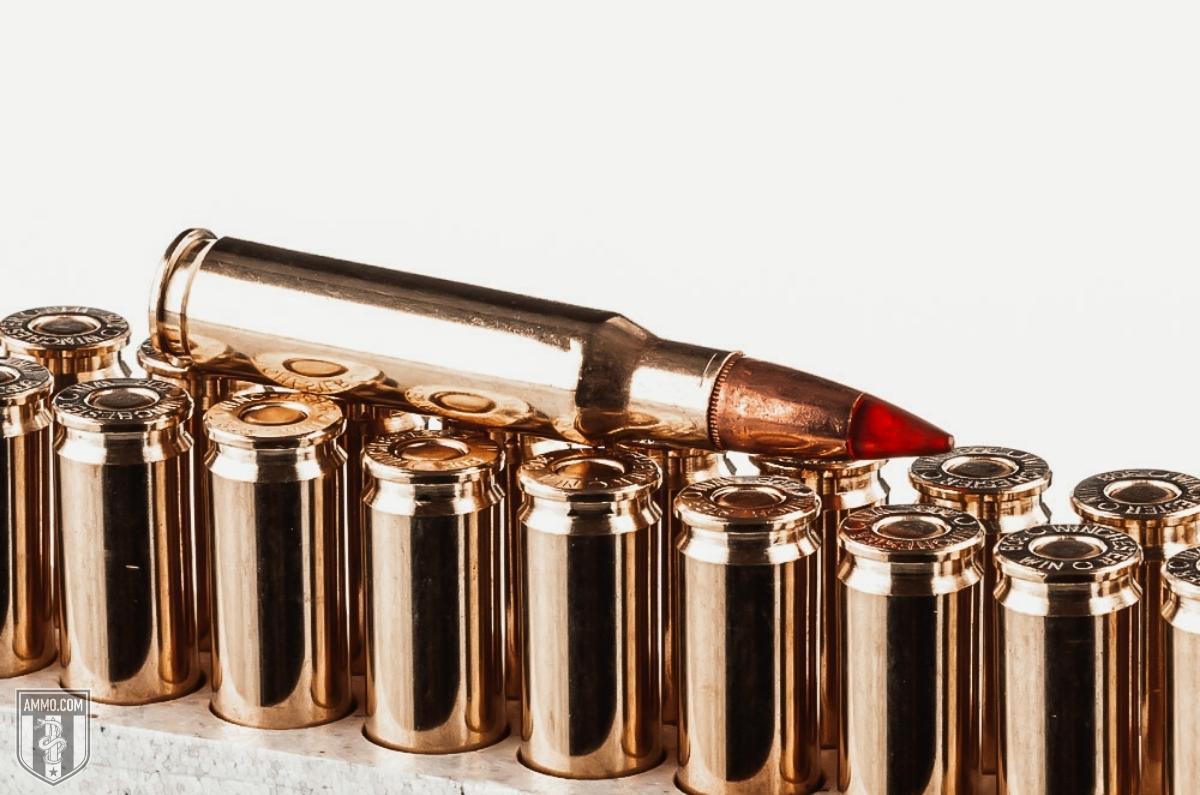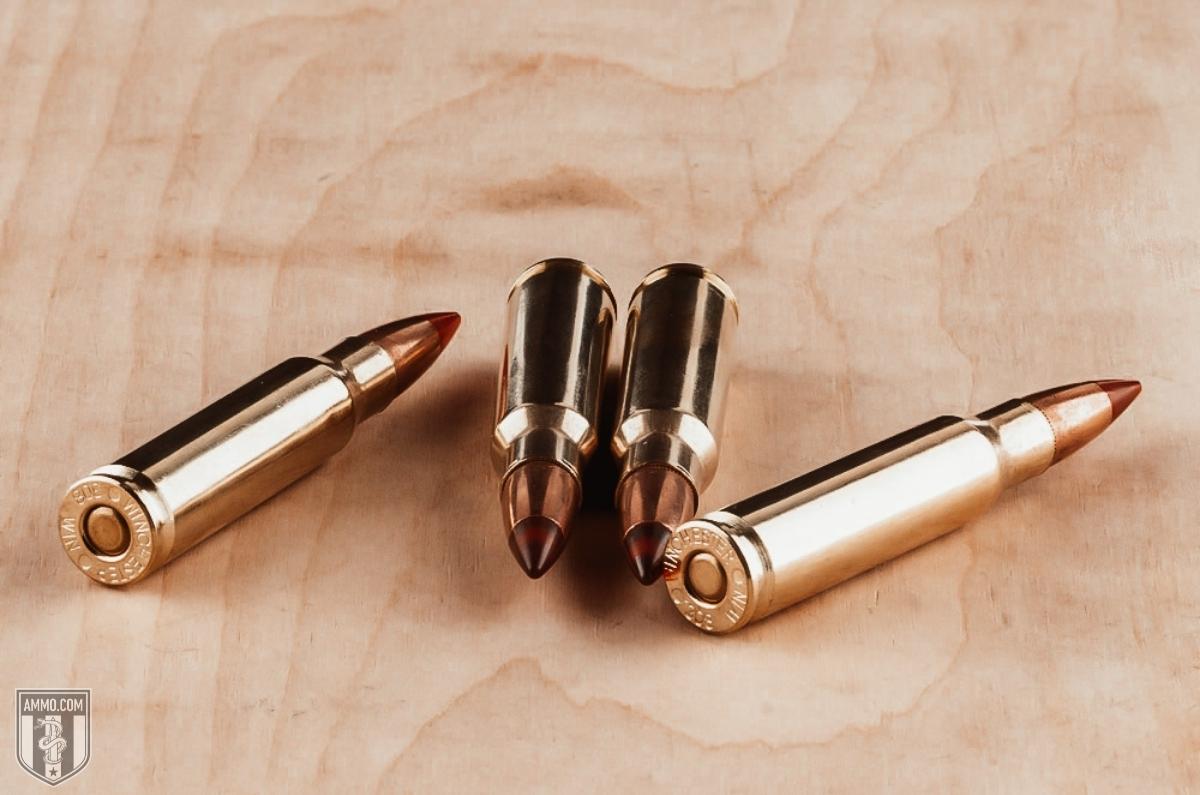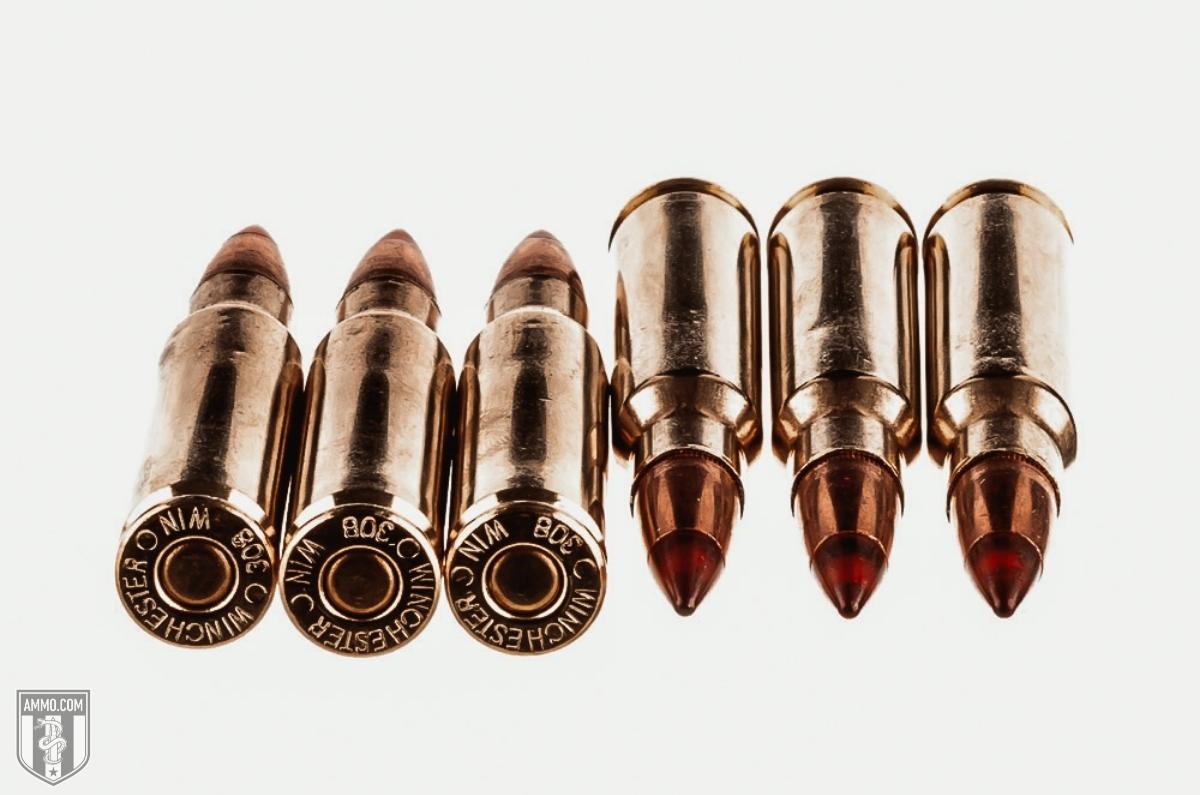450 Bushmaster vs. 308: Big Bore AR-15 Hunting Cartridges
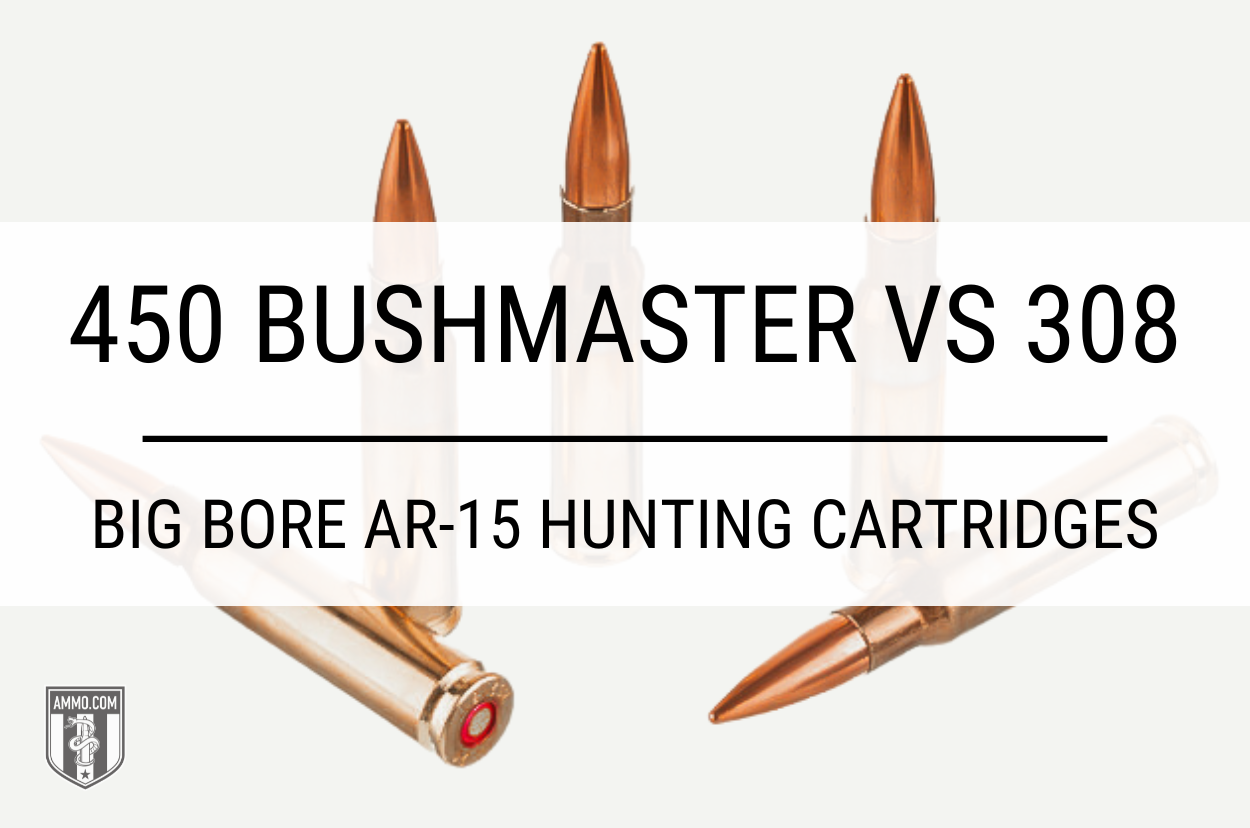
The 450 Bushmaster allows a deer hunter to convert their AR-15 carbine into a whitetail slaying machine simply by changing its bolt, barrel, and magazine follower.
But is it worth converting your AR-15 to the relatively new 450 Bushmaster – or would you be better served by sticking with the all-American hunting cartridge, the 308 Winchester?
In this article we analyze the differences between the 450 BM and the 308 Win so that you can make a more informed decision on your next hunting rifle cartridge.
What Is the Difference Between 450 Bushmaster and 308?
The 450 Bushmaster fires a 0.452” diameter bullet: almost 50% wider than the 308 Winchester’s 0.308” diameter bullet. Furthermore, the 308 has a bottleneck case, whereas the 450’s case is straight-walled.
Cartridge Specs
When evaluating centerfire cartridges, it’s good to begin by comparing their physical specifications. The 308’s bottleneck case doesn’t just look different from the 450’s straight-walled one. It also improves ballistic performance (as it prevents the tail of the bullet from occupying space that powder otherwise could have). The 450’s straight-walled case is an intentional compromise. Regulations in Michigan, Indiana, Illinois, Iowa, and Ohio all require the use of straight-walled cartridges for deer hunting.
Another major difference between 450 and 308 is bullet diameter. The 308 Win fires the tried-and-true 0.308” diameter bullet, whereas the 450 Bushmaster fires a wider (and less ballistically efficient) 0.452” bullet.
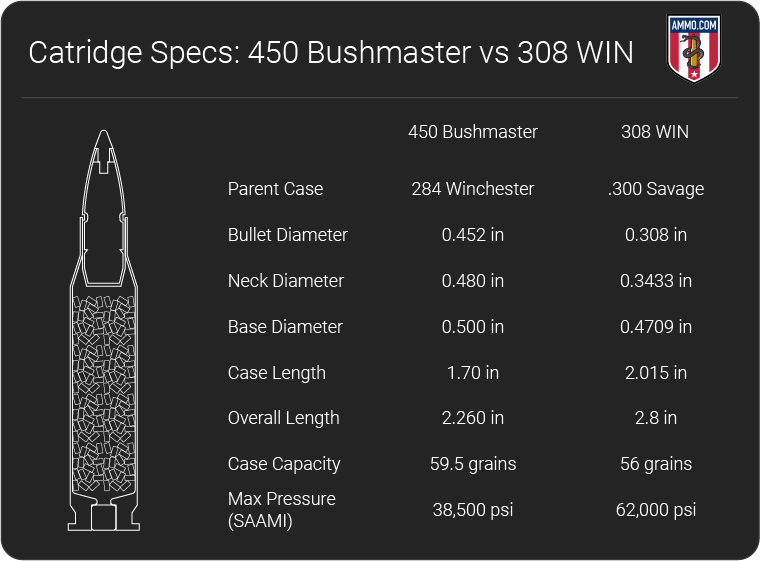
The 450 Bushmaster generally fires bullets weighing between 158 and 300 grains, with 250 and 260 grain loadings being most popular. In contrast, the 308 generally fires bullets weighing between 110 and 180 grains, with 150, 165 and 180 grain loads having the most fans.
The 308’s case length and overall length (OAL) are considerably longer than those of the 450. The 450 is stubby by design, as it was conceived to fit a standard AR-15 magazine (which allows a maximum overall length of 2.26”). Design of the 308 (2.8” OAL) predated formal designation of the STANAG magazine by almost 30 years.
Both rifle cartridges’ case capacities are nearly identical, though the 450 has slightly more (59.5gr H2O) than the 308 (56.0gr H2O).
The final major difference between the two rifle cartridges are their maximum pressures. SAAMI specifies that the 308 can handle 62,000 psi – whopping compared to 38,500 psi for the 450.
Straight-walled cartridges generally have lower chamber pressures. The 450 is no exception, though its pressure is still high relative to the AR-15 recoil system’s capabilities. The powerful 450 generates quite a fair bit of recoil, and exerts considerable bolt thrust against the recoil buffer and spring as a result. The 450’s pressure is just about the highest the AR-15 platform can accommodate before risking becoming damaged.
Recoil
The 308 and 450 are no slouches when it comes to recoil.
Free recoil energy is determined by four factors: firearm weight, powder charge weight, bullet weight, and muzzle velocity.
On average, 450 recoil measures approximately 24 ft-lbs; about one-fifth higher than the 308's average of 20 ft-lbs. To put this into context, the 450 has just 3 ft-lbs less recoil energy than a 2-¾” 12 Gauge shotgun shell firing a 1 ounce slug.
That’s quite a lot of kick for an AR-15, though it can be mitigated with the use of a muzzle brake (or by making the firearm heavier).
The difference in recoil between the 450 and 308 isn’t too drastic, although the 308’s gentler kick does make it the better option for recoil-sensitive shooters.
Muzzle Velocity and Kinetic Energy
The 308 reigns supreme when it comes to muzzle velocity and kinetic energy. This is largely due to its more efficient bottleneck design and higher pressure.
For this comparison, we will compare Hornady Superformance 308 165gr SST and Hornady Custom 450 250gr FTX ammunition.
The 308 bullet screams out of the barrel at a velocity of 2,840 fps, with 2,955 ft-lbs accompanying muzzle energy. Both facets of the 308’s muzzle performance outshine the 450 load’s 2,200 fps and 2,686 ft-lbs.
The 308 still outpaces the 450 when it is loaded with a heavier 178gr ELD-X bullet: 2,600 fps and 2,672 ft-lbs.
In terms of muzzle velocity and muzzle energy, the 308 clearly dominates.
Trajectory
Trajectory is how we quantify a bullet’s flight path as it travels downrange, measured in inches of bullet drop.
A flatter-shooting cartridge is preferable for long-range shooting, as it allows a shooter to make fewer adjustments compensating for gravity. A flatter trajectory also means a cartridge will be more forgiving of ranging mistakes.
There’s a reason why the 308 has been used for long-range shooting for over seven decades, and why you’ll never see the 450 at any F-Class competition firing lines. The 308 exhibits a considerably flatter trajectory compared to the 450 Bushmaster – especially at longer ranges.
To illustrate this, we will compare the same Hornady 308 165gr SST and 450 250gr FTX loads as we did in the previous section.
At 250 yards (which many consider the maximum effective range of the 450), the 250gr FTX exhibits -19” of bullet drop, plummeting compared to the 165gr SST’s -7” drop at the same distance, when zeroed at 100 yards.
This difference only becomes more dramatic at long range. At 400 yards, the 450 Bushmaster round has transitioned to subsonic and exhibited -80” drop, while the 308 has maintained supersonic velocity and only exhibited -29” drop.
The 308, which is designed for long-range shooting, dominates in terms of trajectory.
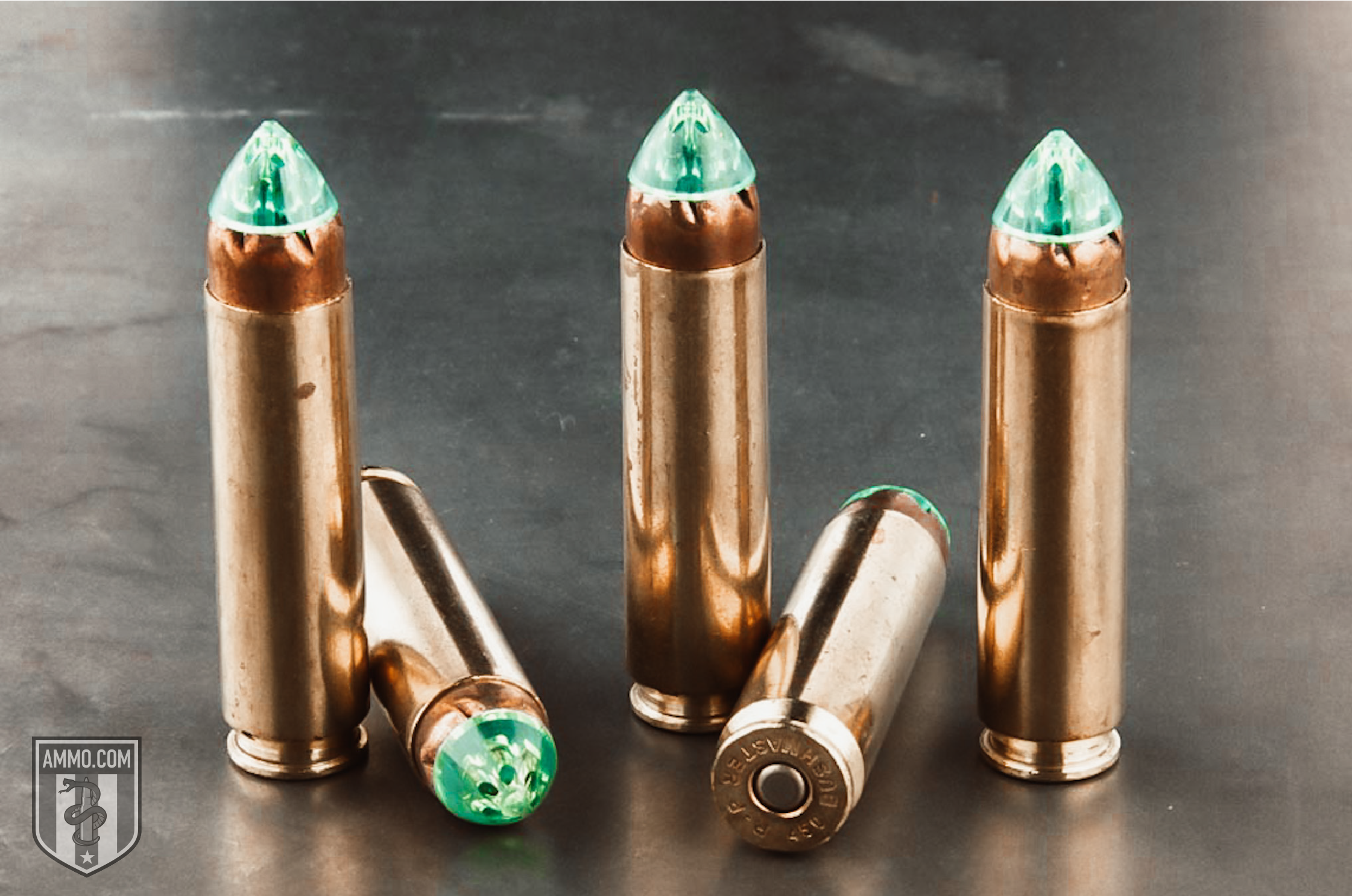
Ballistic Coefficient
Ballistic coefficient (BC) is a measure of how effectively a bullet resists wind drift and frontal air resistance. Put another way, it’s a numeric representation of how aerodynamic a bullet is. A high BC is preferred, as it indicates the bullet will buck the wind more capably and conserve more of its momentum downrange.
Heavy bullets generally have a higher BC. It takes more force to disrupt the flight of a heavier bullet than it does a lighter one. BC also varies from bullet to bullet depending on design, weight, and other factors that are beyond the scope of this article.
Although the 450 typically always fires a heavier bullet, the 308’s aerodynamic bullet designs grant it the higher BC by a wide margin.
The 308 has an average BC around 0.420, whereas the 450 Bushmaster has a BC closer to 0.200.
Picture a gun range where there’s a 10 mph crosswind. At 250 yards, the aforementioned 308 165gr SST exhibits 5” of wind drift; the 450 250gr FTX, 16”.
The 450 bullet may be heavier, but it is more easily blown off course as its wider cross-sectional area presents a larger target to wind.
Sectional Density
Sectional density (SD) is a measure of how efficiently a bullet penetrates its target. It is important to consider when hunting big and medium-sized game, as a bullet that can punch through thick hide, bone, and sinew is required.
SD is calculated via two variables: bullet weight and bullet diameter. The higher its SD, the deeper the bullet is inclined to penetrate. (Note that this is a simplified view of penetration. Other factors are also pertinent such as the bullet’s velocity on impact and capacity for terminal expansion.)
The 308’s dominance in ballistics continues, as its SD is higher than the 450’s. The 308 has an average SD of around 0.26: over 40% higher than the 450’s 0.18 SD.
The 308’s higher muzzle velocity focuses tremendous force into a smaller area, thereby causing its bullet to enter deeper into its target.
This is not to say that the 450 Bushmaster has inadequate penetration; only that the 308 bullet is inherently designed to penetrate body mass more effectively.
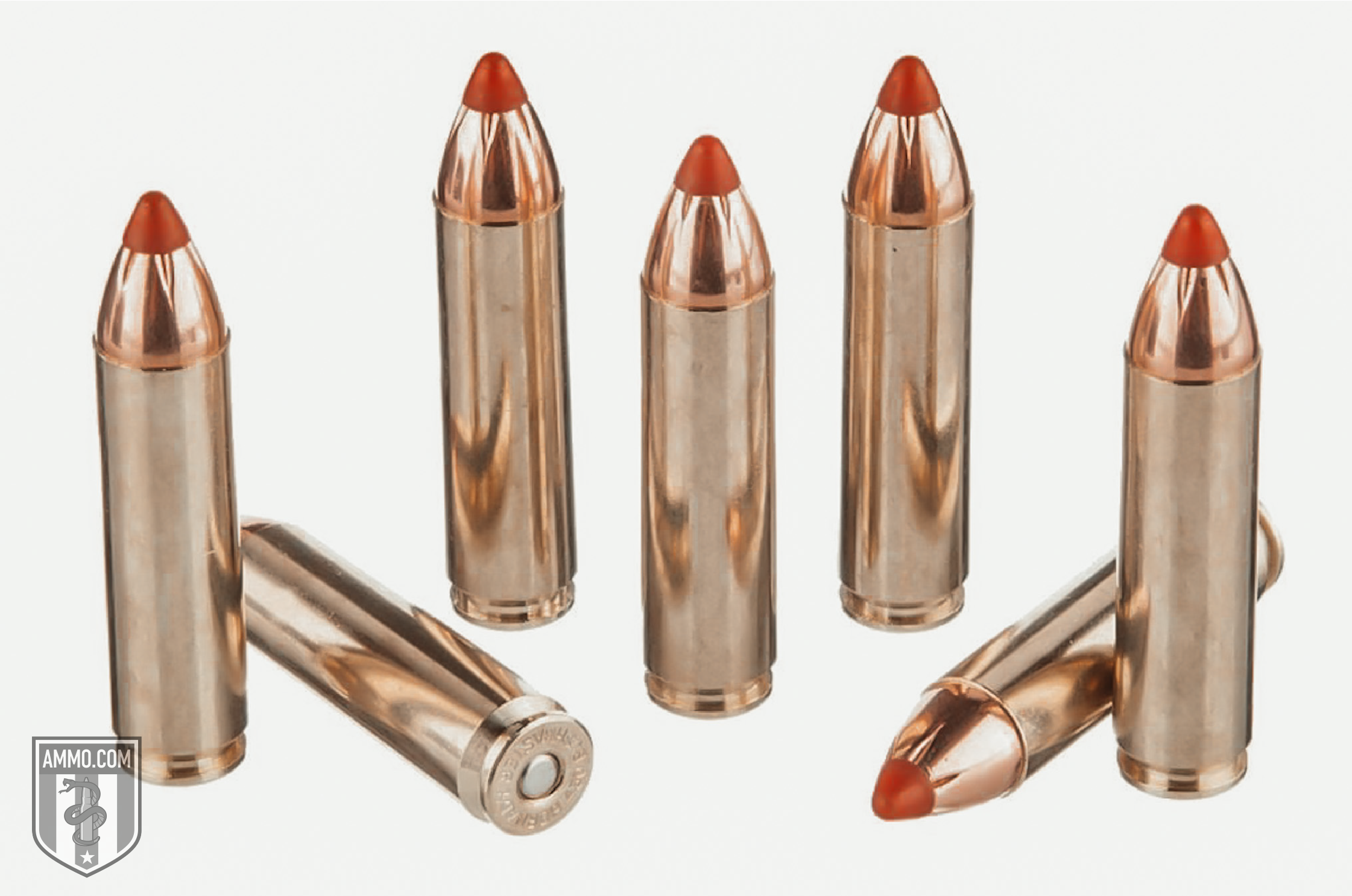
Hunting
The 450 Bushmaster is designed for hunting big game within 250 yards, and it does so extremely well.
Many would consider the 450’s effective range to be restrictive, though. It’s the result of its bullet’s inefficient design, which begins hemorrhaging velocity and momentum the instant it exits the barrel.
As shown in previous sections, the 308 is superior in every ballistic category. It has a longer effective range, maintains velocity and energy farther, resists wind drift more effectively, and penetrates deeper.
This begs the question: Is the 450 even needed as a hunting cartridge? And the answer is unequivocally “Yes!”
Many hunters are constrained by regulations requiring the use of straight-walled centerfire rifle cartridges during deer season. The 450 (and other straight-walled cartridges, such as 350 Legend and 50 Beowulf) offer such hunters a legal option for harvesting venison.
Although the 450 is ballistically inferior to the 308, it is an extremely powerful round within 250 yards: devastating on large game.
Furthermore, rifles chambered in 450 Bushmaster (picture an AR-15 with a 16–18” length) will be lighter and more maneuverable than an AR-10 chambered in 308. A pound or so might not make all that much difference when you’re benchrest shooting, but when you have to carry that rifle through the woods all day, any extra pounds add up quickly.
The 450 Bushmaster offers hunters a lightweight, compact hunting rifle option that packs a huge punch at short distances. High-quality factory ammo can produce MOA to sub-MOA levels of accuracy, making the 450 Bushmaster an excellent option for hunters who value precision.
If you plan on taking shots outside of 250 yards, you will need something more powerful, like a 308 (so long as it’s legal to use for hunting where you live).
Ammo and Rifle Cost/Availability
The 308 Winchester is one of the most popular centerfire rounds in North America, bested only by the 223 Rem. Therefore, there are considerably more rifle and ammo options available for 308 compared to 450 Bushmaster.
Virtually every ammo manufacturer, like Federal, Remington, Barnes, Hornady, and Underwood, has multiple 308 options available to suit all of your hunting and long-range shooting needs. Furthermore, as the 308 is functionally identical to the military’s 7.62x51 NATO, you can find surplus ammo and brass relatively easily.
Buying in bulk is always smart. Make sure to check out our stock of bulk 308 ammo today!
On average, inexpensive FMJ practice ammo runs around $1/round, while premium hunting ammo starts at around $1.80/round.
Comparatively, 450 Bushmaster ammo is more expensive. Practice FMJ ammo starts at around $1.50/round, while hunting ammo goes for no less than $2.50/round.
You should have no issues sourcing 308 ammo, as it can be found in virtually every sporting goods store and gun store. You may find difficulty sourcing 450 Bushmaster ammo if you only shop locally, though.
As far as ammo variety is concerned, the 308’s massive popularity gives it about a 10:1 advantage.
In terms of rifles, the 308 is undoubtedly the more prolific option. There are bolt-action rifles galore from manufacturers like Marlin, Winchester, Remington, Savage, Sako, and Browning. Multiple semi-automatic options are also available, such as the M1A, FAL, AR-10, Kel-Tec RFB, and others.
Any AR-15 you have in your collection is a potential host for the 450. All that’s needed is a new bolt, barrel, and single-stack magazine follower.
There are other options available for the 450 , such as a Henry single-shot rifle, or the Ruger American Ranch or Savage 110 if you prefer a bolt action. Although these rifles would serve you well, they seem to be a bit of a disservice to a cartridge that was specifically designed for the semi-auto AR-15. That concern is moot if your state restricts hunting to bolt-action rifles, of course.
Neither cartridge is well suited for use in a lever-action rifle due to the types of bullets each fires (though you can find older Winchester lever-action rifles chambered in 308).
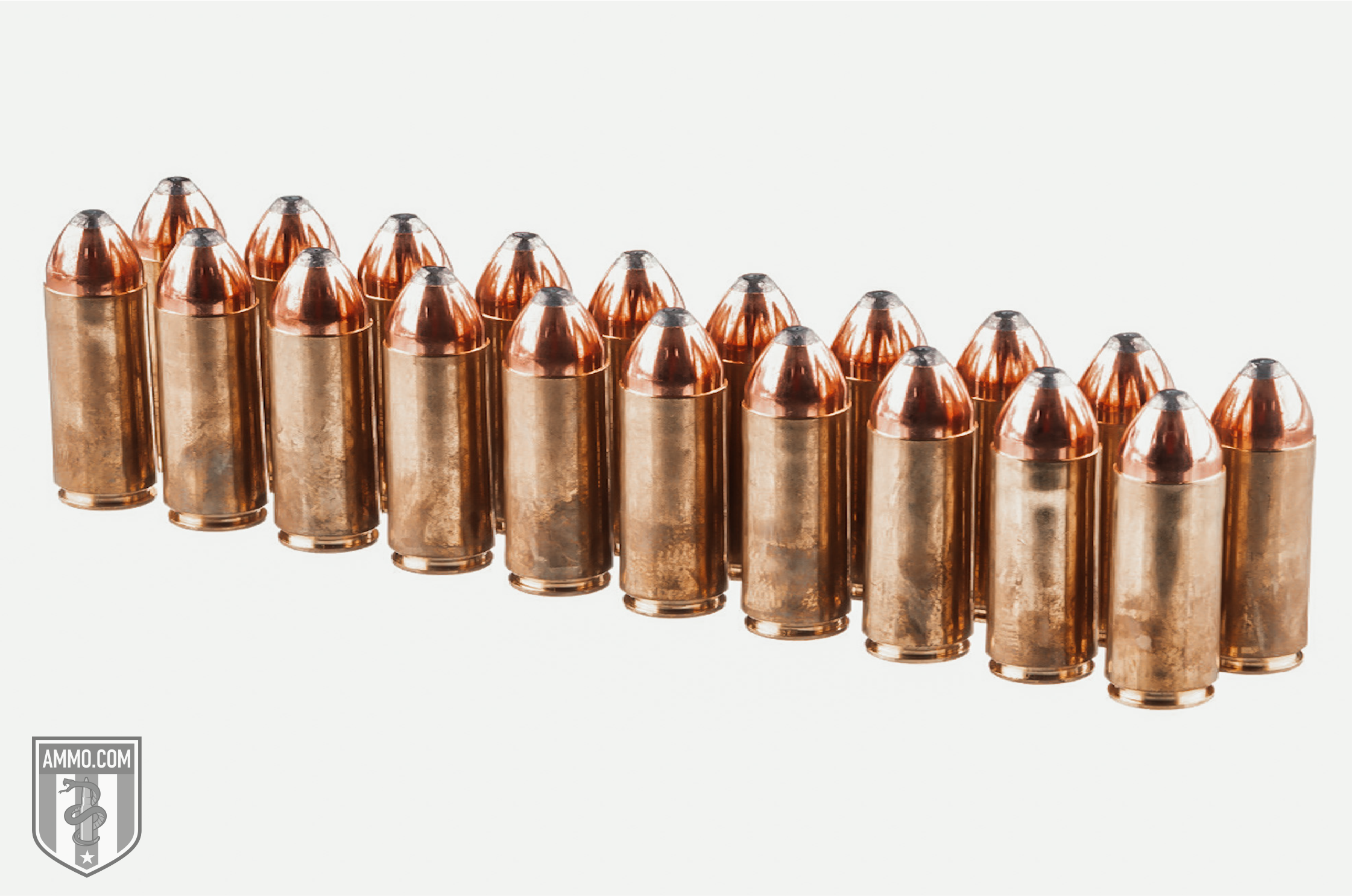
Reloading
If you enjoy rolling your own ammo, then the 308 Winchester and 450 Bushmaster are both right up your alley.
The 308 is a joy to reload in particular. A plethora of 0.308” diameter bullets are available to help you customize hunting or target ammo to your exact specifications. Tons of suitable powders for reloading 308 are also at your disposal.
The fact that the 450 is a straight-walled cartridge is a real blessing. Straight cases are easier to resize than bottleneck ones.
Plenty of .45 caliber bullets are available. Make sure to order the correct ones, though. For rifle bullets, .45 caliber is typically 0.458” (e.g. 458 SOCOM). A diameter of 0.454” is common for handgun rounds (e.g. 454 Casull). Both such bullets should be avoided, as the 450 requires 0.452” diameter bullets.
Exercise caution when reloading the 450, as excess pressure can cause problems with the AR-15 gas system. It is advisable to never exceed published maximum loads, as the 450 can be pressure-sensitive.
Also, if you use a roll crimp on a 450 round with a bullet cannelure, it is advisable to use a very minor crimp (thereby minimizing any additional pressure that could accompany a heavy crimp).
308 Winchester Ballistics
Note: This information comes from ammunition manufacturers. Actual ballistics obtained with your firearm can vary considerably from the advertised ballistics. Ballistics can vary from lot to lot with the same brand and type load.
| Velocity | Energy (ft-lbs) | Trajectory (in.) | ||||||||||||||||||
|---|---|---|---|---|---|---|---|---|---|---|---|---|---|---|---|---|---|---|---|---|
| Bullet | Length (in) | G1 BC | 0yds | 100yds | 200yds | 300yds | 400yds | 500yds | 0yds | 100yds. | 200yds | 300yds | 400yds | 500yds | 0yds | 100yds. | 200yds | 300yds | 400yds | 500yds |
| 110gr TTSX BT | 24 | 0.300 | 2910 | 2604 | 2318 | 2050 | 1801 | 1576 | 2069 | 1656 | 1312 | 1027 | 793 | 606 | -1.5 | 1.8 | 0.0 | -8.3 | -25 | -52.4 |
| 125gr Ballistic Tip | 24 | 0.371 | 3100 | 2840 | 2595 | 2363 | 2142 | 1934 | 2668 | 2239 | 1869 | 1550 | 1274 | 1038 | -1.5 | 1.4 | 0.0 | -6.6 | -19.4 | -39.9 |
| 147gr FMJ | 24 | 0.145 | 2800 | 2202 | 1687 | 1280 | 1035 | 908 | 2559 | 1583 | 929 | 535 | 350 | 269 | -1.5 | 3.0 | 0.0 | -15.5 | -52.4 | -121.6 |
| 165gr PSP | 24 | 0.435 | 2700 | 2496 | 2302 | 2116 | 1939 | 1771 | 2671 | 2283 | 1941 | 1640 | 1377 | 1150 | -1.5 | 2.0 | 0.0 | -8.6 | -25.0 | -50.7 |
| 172gr Impact | 24 | 0.522 | 2635 | 2467 | 2305 | 2150 | 2000 | 1857 | 2652 | 2325 | 2030 | 1765 | 1528 | 1317 | -1.5 | 2.1 | 0.0 | -8.7 | -24.9 | -49.8 |
| 180gr HPBT | 23.5 | 0.488 | 2625 | 2446 | 2274 | 2109 | 1951 | 1801 | 2755 | 2391 | 2067 | 1778 | 1522 | 1296 | -1.5 | 2.1 | 0.0 | -8.9 | -25.6 | -51.5 |
| 190gr HPBT | 23.5 | 0.521 | 2625 | 2457 | 2295 | 2140 | 1990 | 1847 | 2908 | 2547 | 2223 | 1932 | 1671 | 1440 | -1.5 | 2.1 | 0.0 | -8.8 | -25.1 | -50.3 |
A Brief History of 450 Bushmaster
The 450 Bushmaster was released in 2007 by Tim LeGendre of LeMAG Firearms, who based it around the “thumper concept” put forth by the late and great Lt. Col. Jeff Cooper. Cooper appreciated the utility and flexibility of the AR platform, but was unimpressed with the ballistic performance of the 5.56x45mm NATO (which is almost functionally identical to the 223 Rem).
Lt. Col. Cooper’s thumper concept was a new cartridge designed to: (A) be fired from the semi-auto AR-15, (B) have an effective range of around 250 yards, (C) be .44 caliber or larger, and (D) harvest large game with one shot. LeGendre was inspired by Lt. Col. Cooper’s concept and began development of a new round that met its specifications.
LeGendre used the 284 Winchester as the parent case for the design, and dubbed the new cartridge the “45 Professional.” The design was licensed to Bushmaster, which then collaborated with Hornady to manufacture ammo for the new concept.
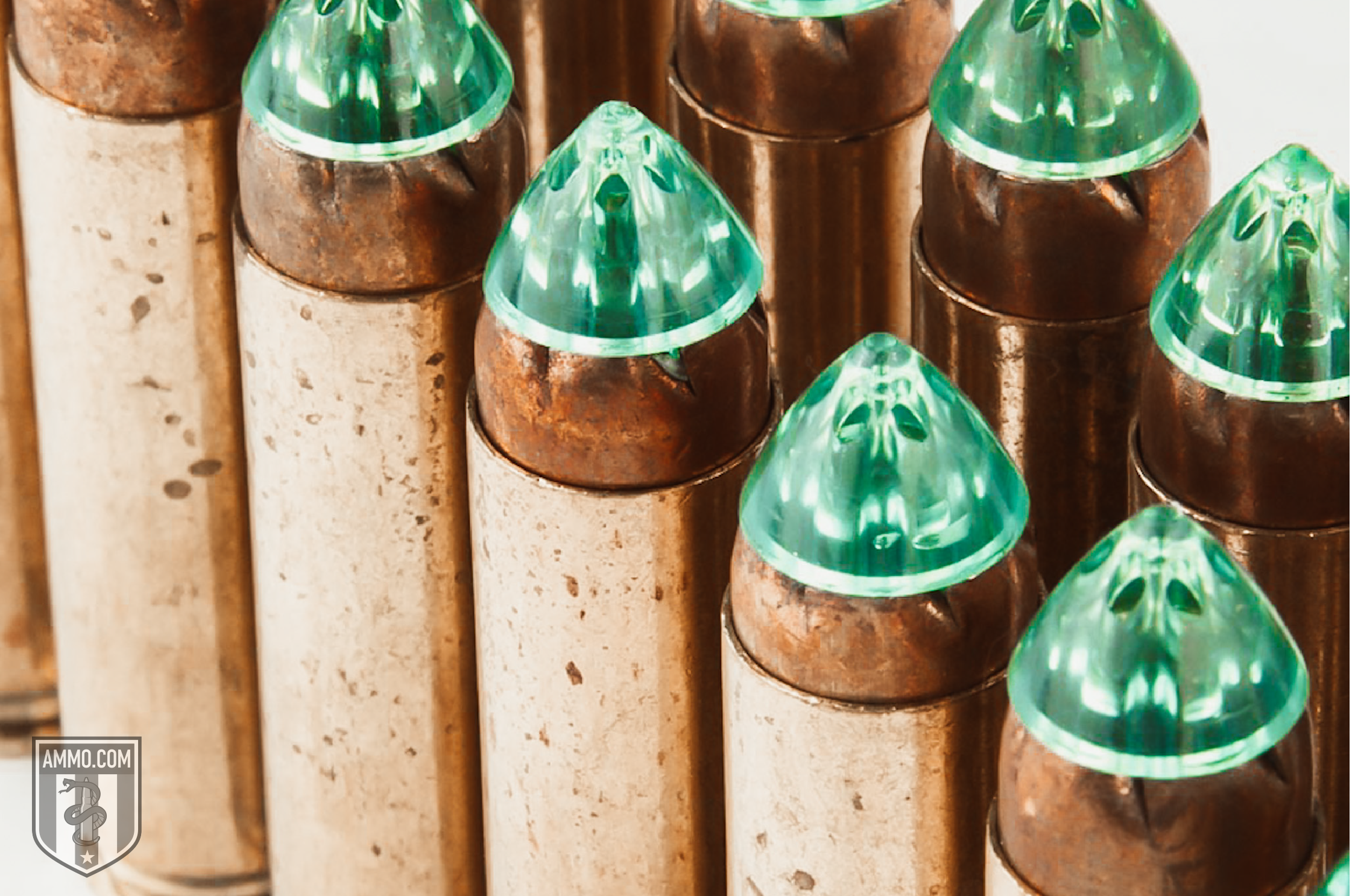
Hornady requested that the case be shortened slightly to accommodate their 250 SST bullet. This change was accepted by Bushmaster and LeGendre. The cartridge was thus renamed “450 Bushmaster” (450 BM for short) and released in 2007.
The 450 Bushmaster is one of the most successful thumper rounds alongside the 458 SOCOM and 50 Beowulf, and boasts the most factory ammo options of the three. Its 2,200 fps muzzle energy, bone-shattering 2,700 ft-lbs of energy, and devastating terminal ballistics have made the 450 extremely popular among hog and deer hunters.
Dedicated 450 Bushmaster AR uppers are currently available, but converting your AR-15 to 450 only requires a new barrel, bolt, and single-stacked magazine follower for your standard 5.56 NATO magazines.
A Brief History of 308 Winchester
The development of the 308 Winchester (military designation: 7.62x51mm NATO) began after the Korean War to replace the long-serving 30-06 Springfield round.
The military officially adopted the 7.62x51mm in 1954. It saw limited service in Vietnam before being replaced by the 5.56x45mm NATO.
Winchester saw the utility of the 7.62x51mm during the round’s development, and introduced it to the commercial market as the “308 Winchester” in 1952 – two full years before the U.S. military formally adopted the cartridge.
The 308 was an almost immediate commercial success due to its astounding accuracy and stopping power, as well as its effective range out to 1,000 yards (with appropriate loadings). The 308 Win has remained a preferred hunting and competition cartridge since shortly after its introduction.
One of the appeals of the 308 for big game hunting is its versatility in bullet weight, typically ranging between 120 to 180 grains.
Although the 6.5 Creedmoor and 300 Win Mag are becoming more popular in the hunting and precision shooting circles, there is no shortage of shooters who swear by and will never let go of their beloved 308 Winchester.
Check out the full history of the cartridge on our 308 Winchester history page.
If you’d like to learn more about how the 308 compares to other cartridges, check out these articles:
Final Shots: 450 Bushmaster vs 308
The 308 Winchester is superior to the 450 Bushmaster in every ballistic category. It has a longer effective range, lower felt recoil, better penetration, and a flatter trajectory.
The 450 Bushmaster occupies a special niche that can only be filled by a few other hunting cartridges.
Because of its straight-walled case, the 450 Bushmaster allows hunters in restrictive states like Ohio and Michigan to use centerfire rifle cartridges for deer and large game hunting.
The 450 is also designed with the AR-15 rifle platform in mind, which is lighter and less expensive than the heavier AR-10 rifle needed for the 308.
And there is also an immeasurable benefit to choosing the 450 Bushmaster: fun!
There’s nothing like plinking away with a thumper round like the 450. Its recoil, muzzle blast, and semi-auto functionality just add a level of fun and enjoyment that cannot be calculated on a ballistics table.
Sure, the 308 might be more efficient and technically “better” than the 450 Bushmaster, but there’s a coolness factor to the 450 that cannot be quantified or rationalized. So, if you want a 450 Bushmaster, go ahead and get yourself one regardless of whether your state requires such a cartridge for hunting or not.
Sometimes, which cartridge is “best” doesn’t matter as much as which one YOU enjoy most. That’s the beauty of the 2nd Amendment!
Ammo Comparisons
- .308 vs 5.56
- 6.5 Creedmoor vs .308
- .300 Blackout vs .308
- .300 Win Mag vs .308
- .243 vs .308
- .308 vs .30-06
- 7mm-08 vs .308
- .270 vs .308
- 7.62x39 vs .308
- .223 vs .308
- .338 Lapua vs .308
- .380 ACP vs 9mm
- .223 vs 5.56
- .300 Blackout vs 5.56
- 9mm vs 45 ACP
- 9mm vs 40 S&W
- .357 SIG vs 9mm
- 10mm vs 9mm
- 9mm vs 9mm Luger
- .243 vs .270
- .300 Win Mag vs .30-06
- .270 vs .30-06
- .40 vs .45
- 38 Special vs 357
- 9mm vs 40 vs 45
- 5.56 vs 7.62x39
- 338 Lapua vs .30-06
- .30-30 vs .30-06
- 300 PRC vs 338 Lapua
- .30-06 vs 7mm
- 300 Win Mag vs 338 Lapua
- 300 PRC vs 300 Win Mag
- 300 WSM vs 300 Win Mag
- 338 Win Mag vs 338 Lapua
- 12 Gauge vs 20 Gauge
- 10mm vs 357 Mag
- .30-30 vs 7.62x39
- 224 Valkyrie vs 22-250
- 17 HMR vs 22 Mag
- 7.62x39 vs .300 Blackout
- 45 ACP vs 45 Auto
- 45-70 vs 30-30
- 300 Blackout vs 223
- 357 Magnum vs 9mm
- 350 Legend vs 300 Blackout
- 224 Valkyrie vs 223
- 45 ACP vs 38 Super
- 6.5 Grendel vs .308
- 17 HMR vs 22 LR
- 10 Gauge vs 12 Gauge
- 22-250 vs 223
- 45 Colt vs 45 ACP
- 350 Legend vs 30-30
- 5.7x28 vs 223
- 5.7 vs 9mm
- 5.56 vs 5.7
- 22 vs 9mm
- Buckshot vs Birdshot
- 450 Bushmaster vs 308
- 450 Bushmaster vs 223
- Buckshot vs Slug
- 6.5 Grendel vs 5.56 vs 223
- 6mm ARC vs 6.5 Grendel
- 44 vs 45
- 458 SOCOM vs 5.56
- 357 vs 44
- 32 ACP vs 380
- 300 Win Mag vs 338 Win Mag vs 338 Lapua Mag
- 450 Bushmaster vs 458 SOCOM vs 50 Beowulf
- 6mm Creedmoor vs 6.5 Creedmoor
- TMJ vs FMJ
- 44 Special Vs 44 Magnum
- 45 90 vs 45 70
- 6.8 Western vs 6.8 SPC
- 50 Beowulf vs 50 BMG
- 26 Nosler vs 6.5 PRC
- 28 Gauge vs 410
- 6.8 SPC vs 5.56
- 6.8 SPC vs 6.5 Grendel
- 6.8 Western vs 7mm Rem Mag vs .28 Nosler
- 6.8 Western vs 6.5 Creedmoor
- 22 Hornet vs 223
- 6.8 Western vs 6.5 PRC
- .410 vs 12 Gauge
- .410 vs 20 Gauge
- 22 LR vs 22 Mag
- 6mm ARC vs 243
- 7mm-08 vs 270
- 243 vs 6.5 Creedmoor
- Nickel vs Brass Casing
- 204 Ruger vs 223
- 50 Beowulf vs 5.56
- 260 Remington vs 6.5 Creedmoor
- 6mm Remington vs 243
- 28 Nosler vs 300 PRC
- 50 Beowulf vs 50 AE
- 22 Nosler vs 22-250
- 450 Marlin vs 45-70
- 300 Win Mag vs 300 Norma
- 458 SOCOM vs 300 Blackout
- 38-55 vs 45-70
- 22 Hornet vs 22 LR
- 300 Norma vs 338 Lapua
- 338 Lapua vs 50 BMG
- 28 Nosler vs 300 Win Mag
- 28 Nosler vs 6.5 Creedmoor
- 204 vs 22-250
- 458 SOCOM vs 45 70
- 44 40 vs 45 70
- 6.8 SPC vs 6.5 Creedmoor
- 450 Bushmaster vs 30-06
- 7mm Rem Mag vs 300 Win Mag
- 30 Carbine vs 223
- 25-06 vs 30-06
- 26 Nosler vs 28 Nosler
- 16ga vs 12ga
- 30 06 vs 7.62 x54R
- 9mm Makarov vs 9mm Luger
- 350 Legend vs 223
- 30 Carbine vs 5.56
- 6.5x55 vs 6.5 Creedmoor
- 6.5 Creedmoor vs 270 vs 25-06
- M193 vs M855
- 450 Bushmaster vs 458 SOCOM
- 6.5 Grendel vs 6.5 Creedmoor
- 350 Legend vs 5.56
- .277 Fury vs 6.8 SPC
- 277 Fury vs 300 Win Mag
- 10mm vs .45 ACP
- 277 Fury vs 223
- 6.8 SPC vs 300 Blackout
- 6.5 PRC vs 6.5 Creedmoor
- 277 Fury vs 308
- 277 Fury vs 6.5 Creedmoor
- 350 Legend vs 450 Bushmaster
- 277 Fury Vs 5.56 NATO
- 10mm vs 40S&W
- 32 ACP vs 9mm
- 32 Special vs 9mm
- 8.6 Blackout vs 300 Blackout
- 30 Super Carry vs. 9mm
- 5.56 vs 9mm
- .50 Action Express vs 9mm
- 7.62x25 vs. 9mm
- 10mm vs 44 Magnum
- 300 Blackout vs 300 Win Mag
- 6.5 Grendel vs 300 Blackout
- 460 Rowland vs 10mm
- 300 RUM vs 300 PRC
- 300 Norma vs 300 PRC
- 45 GAP vs 45 ACP
- 7mm PRC vs 300 Win Mag
- 300 PRC vs 6.5 Creedmoor
- 300 PRC vs 308
- 357 SIG vs 357 Mag
- 7.62x39 vs 7.62x51
- 243 Win vs 223 Rem
- 30 Nosler vs 300 PRC
- 6.5 Creedmoor vs. 30-06 Springfield
- 450 S&W vs. 44 Magnum
- 6.5 Creedmoor vs. 300 Win Mag
- 454 Cassull vs. 45-70 Govt
- 454 Cassull vs. 44 Mag
- 7.62x54r vs. 308 Winchester
- 22 ARC vs. 223 Rem
- Subsonic vs. Supersonic Ammo
